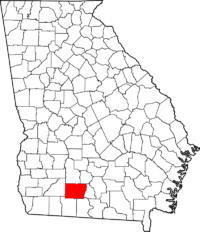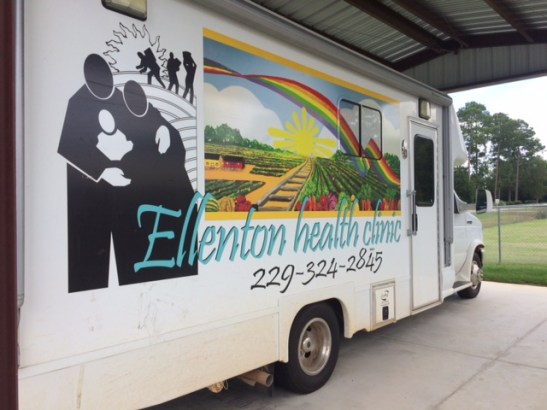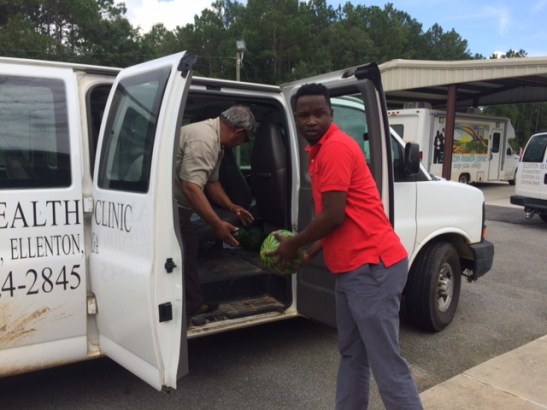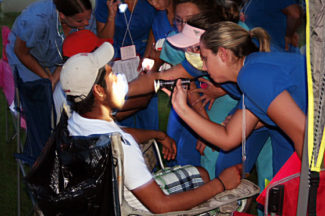The fields in Colquitt County in South Georgia are green this time of year and laden with cucumbers, eggplant and melons — vegetables that represent summertime and healthy eating.

Many of the people who pick them, though, have health challenges.
The farmworkers who move through the region, harvesting and packing the produce, are at a higher risk for certain health problems — particularly diabetes and hypertension, says Judy Wold, clinical professor of nursing at Emory University, who directs a two-week program of health care services for farmworkers there during summers.
The farmworkers also often face barriers to health care. Some, including H2-A guest workers, who are eligible to buy insurance on the health exchanges set up under the Affordable Care Act, could lose access to coverage if the law is repealed or replaced.
Area farmworkers get medical care at the Ellenton Health Clinic in Colquitt County year round.
“Diabetes and hypertension are the two most prevalent problems,” says Cheryl Kicklighter, the clinic’s director.
The clinic is open to all farmworkers but it mostly sees migrants, providing about 5,000 to 6,000 office visits per year.

“They’re hardworking people. They burn a lot more calories than I do sitting at the computer,” Kicklighter says.
The Emory-led program takes nursing students at the university, pharmacy students from the University of Georgia, as well as physical therapists and dental hygienists to deliver care to migrant workers on Colquitt farms.
“Every night we go to a different camp,” Wold says. The workers work 12- to 14-hour days and they don’t generally stop until dark, she said.
“Diabetes is a huge health concern” among the farm laborers, says Wold.
Farmworkers may be vulnerable to developing type 2 diabetes for a number of reasons, including the poverty that so many experience and a genetic predisposition among some ethnicities that are heavily represented in the farmworker population, according to the National Center for Farmworker Health (NCFH).
“A lot of the workers are on diets that lack much choice,” Kicklighter says. Meals are frequently tortillas and meat, with the addition of fruits as available, she said. This diet is high in fat and carbohydrates, she said.
It’s the kind of food that is accessible in high-poverty communities, said Bobbi Ryder, president and CEO of the Texas-based NCFH.

In addition, stress has an effect on blood glucose and may be a contributor to type 2 diabetes, according to the NCFH. Farmworkers may face high stress levels from the combination of hard work, low pay, labor abuses, and migration challenges, the center says.
In addition, pesticide exposure is a significant health risk and has been shown to raise the chance of diabetes, according to the Migrant Clinicians Network, a network of health professionals who staff community clinics for farmworkers.

Other frequent health issues for farmworkers are back pain and musculoskeletal problems, because of the kind of labor they perform, as well as skin rashes and fungal infections from contact with foliage and pesticides, Wold said.
The bathing conditions are bad. “Everyone gets athlete’s foot,” she said.
The increased health risks of the work are coupled with low access to health care.
A 2013-2014 National Agricultural Workers Survey found 35 percent had health insurance, compared with 82 percent of the adult population in the United States that year.
Across the United States, the roughly 50 percent of farmworkers who are citizens or legal residents are technically eligible to buy coverage through the ACA health exchanges, and more citizens gained Medicaid coverage in states that have expanded Medicaid under the ACA.
Farmworkers with H2-A visas are not eligible for Medicaid, but they can buy insurance through the health exchanges, just as citizens can. They can do so online or seek assistance from insurance navigators sometimes based in community health clinics.

The ACA requires employers of more than 50 people to provide health insurance for their workers, including H2-A workers, although the requirement is waived when work is mostly seasonal.
“It’s unclear how many employers offer health insurance for their H2-A workers,” said Alexis Guild, senior health policy analyst at Farmworker Justice, a nonprofit subsidiary of the National Council of La Raza, an advocacy groups for issues important to Hispanic Americans.
There’s confusion about eligibility and the process of enrollment, Guild said.
Guest workers have to enroll within 60 days of coming into the United States, but there’s not enough in-person assistance, she said.
Agriculture is a $992 billion industry in the United States and a $13.8 billion industry in Georgia. Colquitt County is the vegetable basket of the state, bringing in the highest agricultural revenue of all Georgia counties.
Many areas important to the nation’s agriculture — South Georgia included — are extremely dependent on migrant and seasonal farmworkers.
“We ought to at least have the decency to extend health insurance to those people while they are here,” Wold said.
Stell Simonton is a freelance journalist in Atlanta. A former digital editor/producer for the Atlanta Journal-Constitution, she has contributed to publications including the Christian Science Monitor, the Washington Post, Youth Today and the Juvenile Justice Information Exchange.

